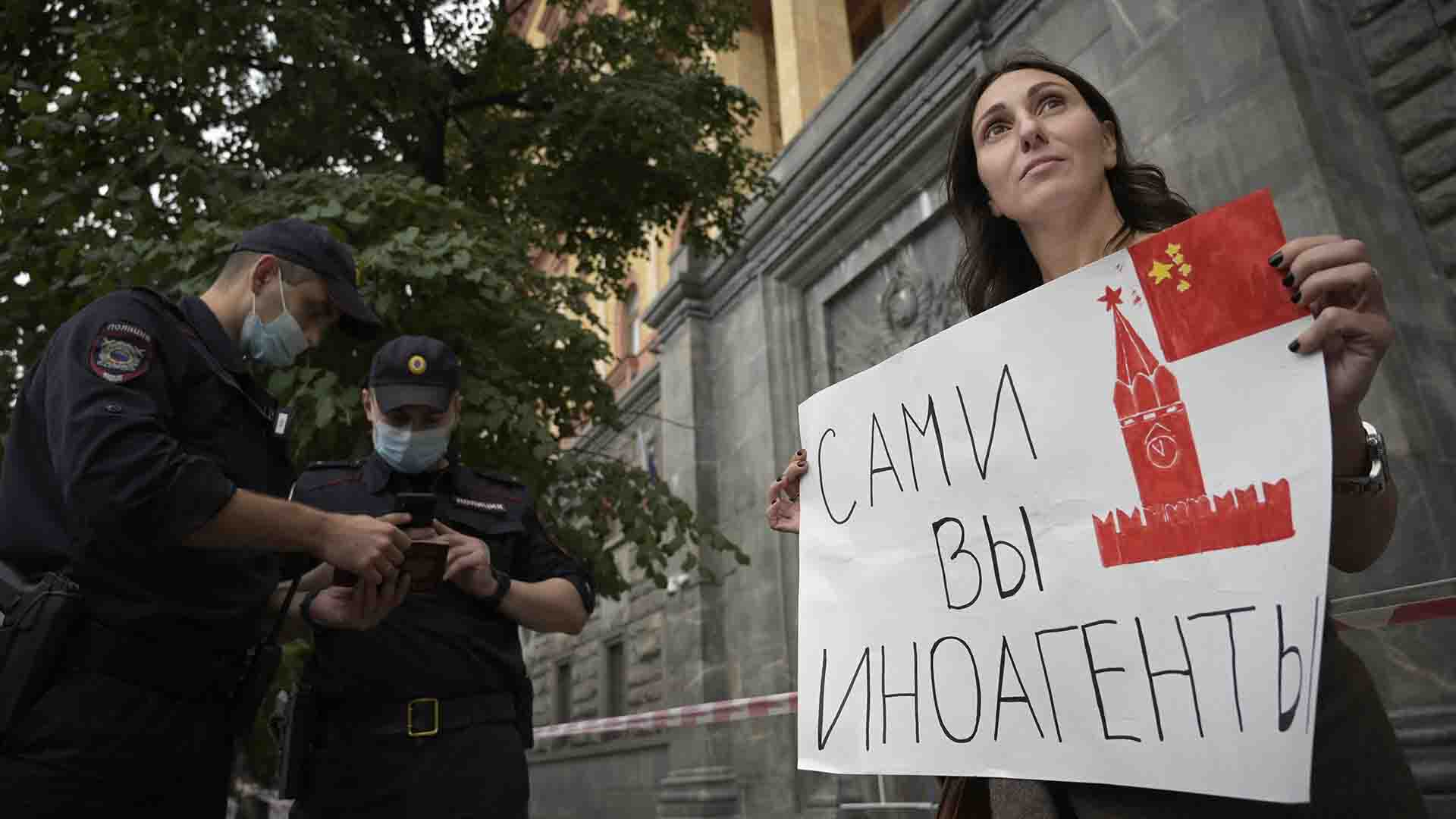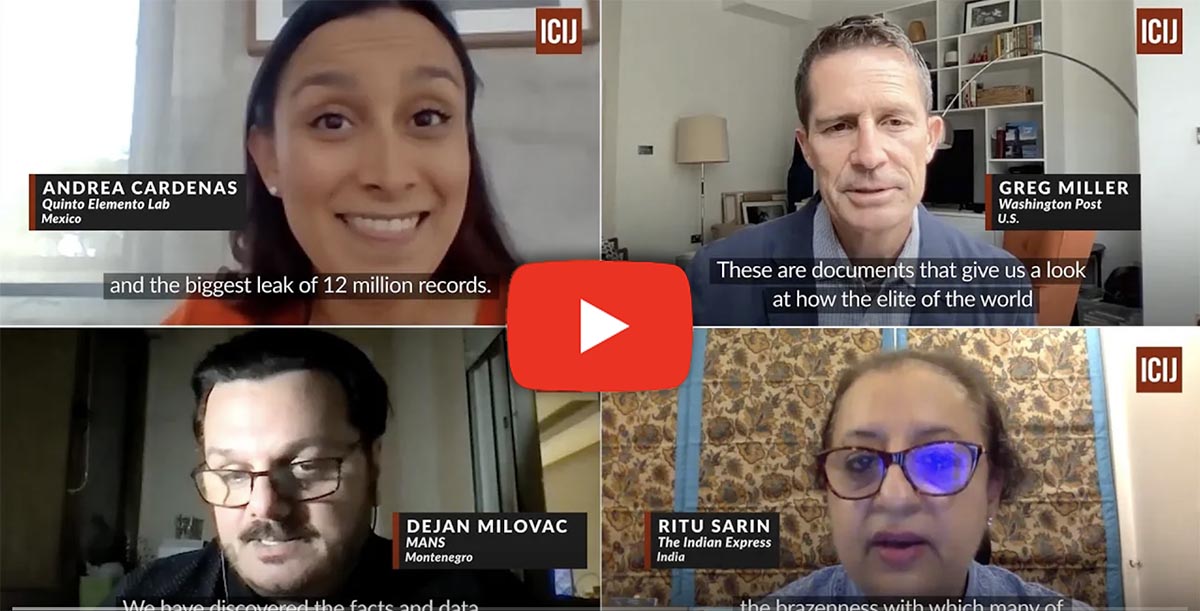Even as governments worldwide responded to the Pandora Papers with major financial reforms, other governments and their supporters responded with legal and regulatory crackdowns, legal threats and verbal attacks against the journalists who produced the blockbuster exposé of the offshore financial system.
Legislators in Honduras took steps to designate some journalists and civil society actors for extra scrutiny, while leaders and their allies in other countries launched press attacks and sought to discredit individual journalists. In Russia, a pro-Kremlin lobbyist who has successfully petitioned the government to place regulatory restrictions on independent media outlets announced a similar complaint against the International Consortium of Investigative Journalists, which led and organized the Pandora Papers probe.
The press crackdowns and attacks are more signs of the challenges facing free and independent new organizations in countries around the world — and perhaps signs of how vulnerable authoritarian regimes are to damaging revelations about the secret financial dealings of their leaders.
The Pandora Papers is a global investigation led by ICIJ, published earlier this month, that included more than 600 journalists representing 150 partner media organizations from 117 countries and territories. Based on a leak of 11.9 million documents of 14 offshore services providers, the trove revealed the secret holdings of more than 330 politicians and high-level public officials in more than 90 countries and territories, including 35 country leaders. Ambassadors, mayors and ministers, presidential advisers, generals and a central bank governor appear in the files.
While the project has led to a spate of new reform efforts, it also drew pushback from several governments and their allies.
Honduras
In Honduras, the National Congress approved changes to the country’s anti-money laundering and other laws that would designate civil society organizations that investigate, evaluate or analyze public management, including the work of the government, as “politically exposed persons,” or PEPs. The groups that could be affected are non-profit news organizations, including an ICIJ partner, Contra Corriente.
The new law would invert a key anti-money laundering tool — the PEP designation — and turn it against the journalists and civil society groups that investigate corruption. According to U.S. financial regulators, the term PEP commonly refers to “foreign individuals who are or have been entrusted with a prominent public function, as well as their immediate family members and close associates.” The Honduran law would apply the designation to ordinary citizens who try to monitor them.
The law singles out groups that receive or administer foreign aid funds , which is essentially required of any serious small media organization in Central America, where funders of quality journalism are few.
While the meaning and significance of this designation is unclear, civil society groups fear this confusing change could be used to criminalize their work.
The legal changes, which came just a few days after publication of the Pandora Papers that began on Oct. 3, included others that activists believe could criminalize public demonstrations.
Luis Redondo, a deputy from the opposition Pinu-SD Party, denounced the process that led to the vote, saying the session in which it took place lacked a quorum. In an interview with Contra Corriente, he said the legislature’s actions were a response to the Pandora Papers and asserted: “This tells us that there is money laundering and that they are seeking to cover themselves and go unpunished.”
Russia
In Russia, a media lobbyist said he plans to ask the government to designate ICIJ an “undesirable” organization in the country, a move that would effectively prevent Russian news organizations from taking part in ICIJ’s projects.
Alexander Ionov, the founder of the nongovernmental organization “Anti-Globalization Movement in Russia,” announced the day after the Pandora Papers were first published that he was preparing a complaint about ICIJ’s activities for the prosecutor general’s office.
Previous complaints by Ionov against independent news organizations were precursors to the government taking legal and regulatory action against them.
If the government upholds Ionov’s complaint against ICIJ, it would become a criminal offense to work with ICIJ within Russia and make it illegal even to share links to ICIJ’s website.
Roman Anin, editor of ICIJ’s Russian partner IStories, described Ionov’s request as demonstrating a desire “to keep only state TV channels in Russia so that Russian readers will get information only from the censored media, not the independent media”.
He added: “They try to isolate people from the truth.”
Ionov’s previous complaints targeted IStories, Anin, and another independent outlet, Meduza. All are now designated “foreign agents,” a classification that requires reporters to publish “hazard” warnings at the top of anything they publish — even jokes on Twitter — and exposes them to prosecution for their work. The designation came a few months after police raids on iStories’ offices and homes of staff members.
In its reporting on the Pandora Papers project, IStories revealed that offshore companies owned by the former son-in-law of the the chairman of state oil pipeline company Transneft, Nikolai Tokarev, one of Russian President Vladimir Putin’s close friends from the KGB, had received $80 million in contracts from Transneft, had obtained Cypriot citizenship, and co-owned offshore companies with one of Russia’s most notorious criminal bankers. They also revealed how the family of Sergei Chemzov, CEO of the state owned armaments firm, had hidden a $300 million fortune, including a Spanish villa and a superyacht.
The “undesirable” designation is even more severe. Under a 2015 law, it is an offense to work with or even to share the work of an “undesirable” organization. The designation was first applied to a media organization earlier this year by targeting Proekt, the investigative site which broke the exposé into the personal fortune of Putin’s alleged former romantic partner Svetlana Krivonogikh, with whom he reportedly had a child.
The moves in Russia come at a time of an ongoing press crackdown: nine activists and journalists, including prominent Russian-language correspondents for the BBC, leading online investigative group Meduza, Russia’s only independently held TV station, Dozhd, and the American-funded Radio Free Europe/Radio Liberty, were declared “foreign agents” by Russia’s Justice Ministry. They now have to submit to onerous disclosure requirements, including having to attach a lengthy disclaimer to every social media post
In other countries, high-ranking government officials have sought to discredit Pandora Papers’ findings and articles.
Ecuador
In Ecuador, President Guillermo Lasso wrote a letter to the director of newspaper El Universo, questioning the outlet’s “journalistic practices and ethical standards” and accusing the publication of taking part in a “smear campaign” against him.
Reporting by ICIJ and El Universo linked Lasso to several offshore entities, including two trusts registered in South Dakota to which he transferred assets in 2017 and others that have since been dissolved. In response, Lasso said that he has no control or interest over the trusts, and that “all past use of any international entity” was legitimate.
In his letter to El Universo, Lasso complained that the articles didn’t mention what he said was millions of dollars in taxes he and his businesses have paid in Ecuador. He ends his letter asking the newspaper: “Today when you are silent, when you do not even meet the journalistic standards that you set for yourself, I wonder: who stops you?”
Republic of Congo
President Denis Sassou-Nguesso‘s office denied that the autocratic leader appeared at all in the Pandora Papers — despite his name and title being listed in the leaked documents as the owner of a secretive BVI company. The president’s spokesman called the Pandora Papers “lies” and said Sassou-Nguesso was studying legal action.
Serbia
Serbian Finance Minister Siniša Mali told a press gathering that journalists from ICIJ partner KRIK were “lying” and refused to answer questions related to their findings, that Mali had created two shell companies in the British Virgin Islands in 2011 and used them to buy apartments. .
Serbian President Aleksandar Vučić claimed journalists didn’t prove that Mali was the owner of the apartments and said that an unspecified “court verdict” showed the opposite. He didn’t identify the verdict or the court.
Colombia
In Colombia, tax chief Lisandro Junco issued a press release saying that ICIJ partners El Espectador and CONNECTAS were seeking to “attack and discredit” him. Pandora Papers documents linked Junco to a company in Delaware, an account in Cyprus and a so-called virtual office in London managed through a provider based in Dubai. Junco responded that he publicly declared the U.S. company and denied having assets in Cyprus and London. Junco has questioned the veracity of the documents published and said he will take legal action.
Belarus
In Belarus, ICIJ partner Ales Yarashevich came under attack from Belarusian government-allied media. In posts on the Telegram platform, Lyudmila Gladkaya, a well known figure in pro-government media, lashed out at Ales, calling him, among other things, a “media parasite” and “a regular liar.”
Pakistan
In Pakistan, backlash came from the private sector: As a part of the Pandora Papers collaboration, Umar Cheema and Fakhar Durrani, reporters working for ICIJ media partner in Pakistan, The News, published an article about an offshore company owned by Axact FZ LLC, a Pakistani company that runs an alleged worldwide diploma mill first exposed by the New York Times in 2015. According to their reporting, offshore service provider Trident Trust shut down the BVI-registered company, Outreach Global after it did not share information Trident representatives had requested about the company’s beneficial owner, a man named Shoaib Shaikh. Prior to its termination, a number of banks had declined to take it on as a client, and at least one filed a suspicious activity report against the company.
Shaikh is also the Chairman and CEO of a media company called BOL Media Group. Following the publication of Cheema’s report, the media house published several articles with false information wrongly alleging that Shaikh’s names did not actually appear in Pandora Papers documents and that Cheema and Durrani had been ‘paid off’ to plant it in the files.
Turkey
Rönesans Holding, a major Turkish construction company owned by billionaire Erman Ilicak, announced that it was considering legal action following ICIJ and DW Turkey reports that Ilicak’s mother owned two shell companies in the British Virgin Islands. The Pandora Papers showed that one of Ilicak’s mother’s companies, Covar Trading Ltd., earned $105.5 million in income in 2015 and paid almost the entire amount that same year as a “donation” listed under “extraordinary expenses.” Ilicak never responded to ICIJ and DW Turkey’s questions.
Hong Kong
In the aftermath of Pandora Papers, Hong Kong’s former chief executive Leung Chun-ying, known as CY Leung, denounced ICIJ partner Stand News on his Facebook page, saying that the investigation into his offshore dealings has “ulterior motives.” Stand News and ICIJ found that in 2015, while Hong Kong’s top leader, Leung secretly transferred shares he held in a real estate firm’s subsidiary, worth more than $300,000. Leung, who had not responded to ICIJ’s repeated requests for comment, denied wrongdoing and said that he was not required to declare all the details of his holding.




